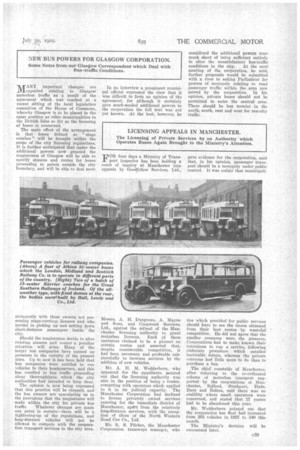LICENSING APPEALS IN MANCHESTER.
Page 61

If you've noticed an error in this article please click here to report it so we can fix it.
The Licensing of Private Services by an Authority which Operates Buses Again Brought to the Ministry's Attention.
F"four days a Ministry of Transport inspector has been holding a court of inquiry at Manchester into appeals by Goodfellow Services, Ltd.,
Messrs. A. H. Durgenan, A. Mayne and Sons, and Coopvvood Services, Ltd., against the refusal of the Manchester licensing authority to grant motorbus licences. Each of these operators claimed to be a pioneer on certain routes and asserted that, despite considerable competition, it had been necessary and profitable substantially to increase services by the addition of new vehicles, Mr. A. H. M. Wedderburn, who appeared for the appellants, pointed out that the licensing authority was also in the position of being a trader, competing with operators which applied to it in its judicial capacity. The Manchester Corporation had declined to license privately owned services_ catering for the immediate district of Manchester, apart from the relatively long-distance services, with the exception of those of the North Western Road Car Co., Ltd.
Mr. R. S. Pilcher, the Manchester Corporation tramways manager, who
gave evidence for the corporation, said that, in his opinion, passenger transport should be a monopoly under public control. It was unfair that municipnli:
ties which provided for public services should have to see the cream skimmed from their best routes by wasteful competition. He did not agree that the smaller concerns were the pioneers. Corporations had to make known their intentions to run a service, following elaborate procedure which entailed inevitable delays, whereas the private concerns had little more to do than to purchase a bus. • The chief constable of Manchester, after referring to the co-ordinated scheme of motorbus transport supported by the corporations ot Manchester, Salford, Stockport, Hyde, Bury and Bolton, said there was no stability where small operators were concerned, and stated that 17 routes had to be abandoned this year.
Mr. Wedderburn pointed out that the corporation bus fleet had increased from 203 vehicles in 1927 to 349 this mouth.
The Ministry's decision will be announced later.












































































































